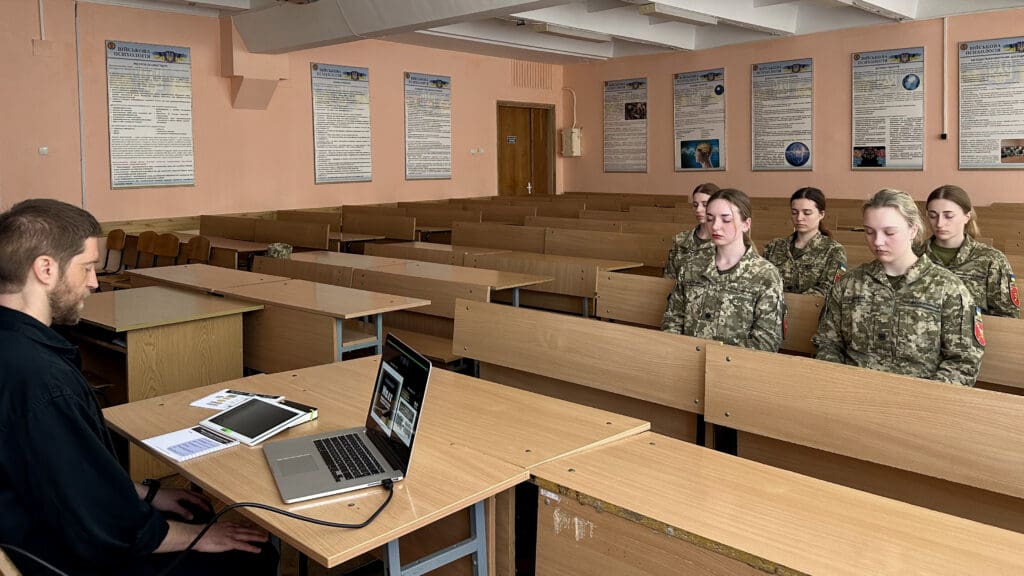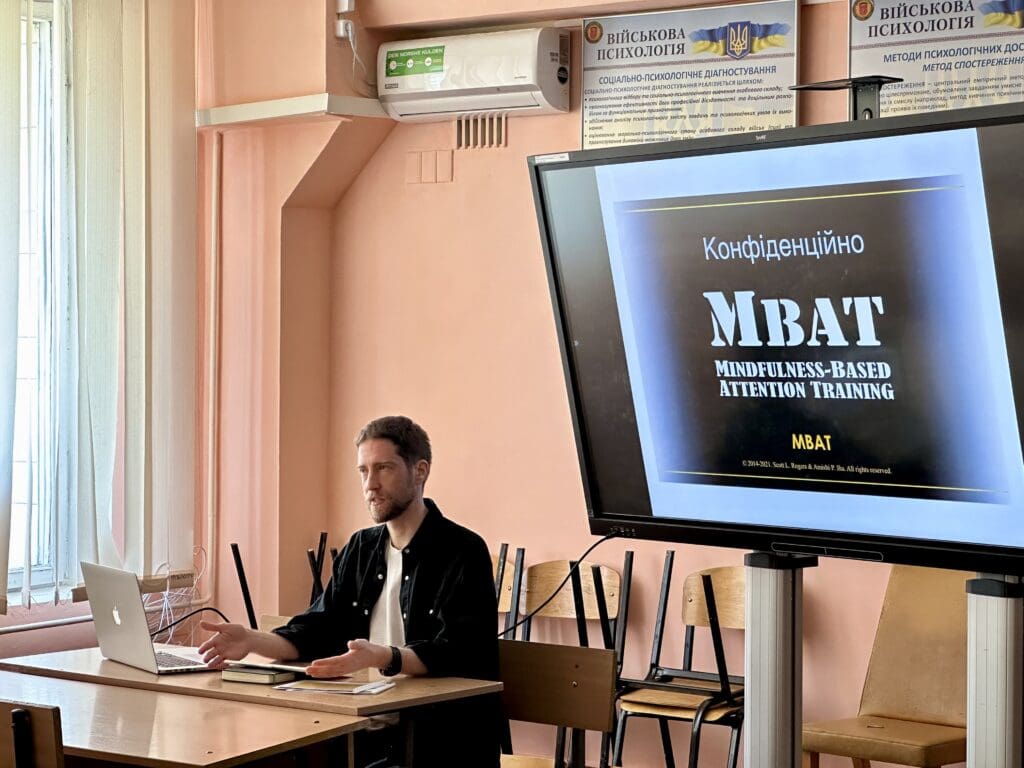
February 24 marks the grim three-year anniversary of the Ukraine War. Since Russia’s full-scale invasion of the country, more than a million people have been killed or wounded on both sides. The conflict has devastated critical infrastructure and shattered livelihoods, precipitating an environmental crisis that will take decades to remediate.
Those working to serve their country, among them government administrators, psychologists, first responders, and military personnel, face intense pressure in carrying out essential roles. “These are the people taking on the most difficult challenges every day, working in high-risk, high-stress environments, on whom the safety and survival of thousands, if not millions, of people depend,” says Valta Pashkovsky, founder of Culture of Mindfulness, a Ukrainian nongovernmental organization based in Kyiv.
“These are the people taking on the most difficult challenges every day,
working in high-risk, high-stress environments, on whom the safety and
survival of thousands, if not millions, of people depend.”
–Valta Pashkovsky
In June 2023, Mind & Life awarded Valta a two-year, $10,000 Contemplative Changemaking Grant to deliver mindfulness and attention training to individuals directly engaged in the war effort. Valta knew from personal experience how transformational mindfulness practice could be. A former advertising creative director and professional DJ, he was planning to pursue a career in film when the war broke out. “The war created a moment of pure clarity,” he says. “I had to ask myself, what was the most important thing I could do to contribute? Of all the things that were somehow within my control, almost everything had to do with my meditation practice.”
To date, more than 170 participants have completed the four-week Mindfulness-Based Attention Training (MBAT) delivered by Valta. Among them are specialists from the Armed Forces, Territorial Defense Forces, National Police, National Guard, State Emergency Services, and State Border Guard Service, along with the heads of various units within Ukraine’s Ministry of Internal Affairs.
MBAT was created by contemplative neuroscientist Amishi Jha and law professor and mindfulness teacher Scott Rogers to help people in demanding professions optimize their performance and well-being. The program has been extensively evaluated through Amishi’s own research at the University of Miami, as well as research conducted by the U.S. Army and others. Since 2020, MBAT has been delivered to special and conventional forces in the U.S. and abroad, as well as to military spouses, firefighters, corporate employees, community leaders, teachers, and medical students. Studies have found the training, including when it is offered by newly trained trainers, results in improved attention and working memory, operational performance, psychological resilience, and well-being.
Working remotely, Scott and Amishi have been supervising Valta’s adaptation of MBAT in Ukraine—working closely with him over several months as he learned to deliver MBAT and received supervision during its early implementation.
Scott describes Valta as an “exceptionally thoughtful and compassionate individual,” deeply committed to his personal mindfulness practice and dedicated to sharing it with others. “A gifted teacher, Valta played a pivotal role in translating the MBAT curriculum into Ukrainian,” he adds, “ensuring it was both culturally attuned and accessible in his native language.”
Through the program, trainees receive a thorough grounding in the principles of mindfulness meditation. Trainings are delivered by Valta both in person and online, depending on participants’ schedules and availability. Over four, two-hour sessions, trainees engage in focused breath attention, body scanning, open awareness, and connection practice, a form of loving kindness meditation. Each session includes two 15-minute contemplative practices. The practice length is based on research supporting that even 12-minute sessions can lead to improvement, with individuals more likely to integrate shorter practices into their daily lives.

The highly interactive MBAT training invites participants to reflect on and share their experiences. “It’s simple, down-to-earth, practical, and connected to daily life,” says Valta. “It helps people understand why practice can be helpful.” Those grappling with emotionally painful memories and experiences—such as the loss of a loved one—share that the connection practice enables them to re-establish a relationship with such memories and observe them from a different perspective, instead of suppressing or avoiding them.
To maintain the enthusiasm of trainees and encourage peer-learning, Valta launched a follow-up supervisory training through WhatsApp messenger. Program graduates who want to connect or ask questions can join on Monday nights at 8:00 p.m.

One of those who participated in the MBAT training in Ukraine was a military psychologist, who left his career as an actor to join the war effort. Valta shares how in December 2024 this man and his brigade were trapped for three weeks in Vovchansk, a city that had fallen to Russian forces. From a hidden basement location, the man continued to connect to Valta’s Monday night group for support and guidance. Eventually, he and his brigade escaped to safety. “One of the benefits of the MBAT training is that it keeps you grounded and present,” says Valta. “It’s about reminding yourself that you have a body. You can see. You can walk.”
Initial research efforts, involving anonymous program evaluations from participants trained by Valta, reveal overwhelmingly positive feedback. Over 90% of respondents agreed on the program’s usefulness both personally and professionally, its relevance to their roles, their satisfaction with the sessions, and the trainer’s proficiency. Additionally, 97% said they were likely to recommend it. As one participant put it, “It is difficult to find time and space, but this program is very useful in the conditions of war.”
This emerging feedback underscores the challenge of making mindfulness training accessible and relevant in extreme environments. Yet, the overwhelmingly positive reception suggests that such training is not only possible but deeply needed. As Amishi put it, “The costs of war extend beyond the battlefield alone—they impact society as a whole, not just over a lifetime, but across generations. I’m grateful for the partnership with Valta. Our shared intention is to help individuals meet the moment by strengthening their capacity for discernment, emotion regulation, and resilience. He is a wonderfully skilled trainer who holds true to MBAT’s core principles and structure, ensuring its impact for those navigating this protracted conflict.”
“Our shared intention is to help individuals meet the moment by strengthening
their capacity for discernment, emotion regulation, and resilience.”
—Amishi Jha
Demand for the program in Ukraine is growing. “The need is huge,” says Valta, adding “I could fill up my whole time with training.” To expand MBAT’s reach, he hopes to equip others to deliver the program. A next step would be to recruit volunteers for a twelve-week “train the trainer” course, to include the four-week foundational training, followed by eight weeks of teacher training.
Valta credits the urgency imposed by the war, and a growing network of friends and colleagues in the mindfulness movement, with helping him to make inroads within rigid government structures that can be hard to penetrate. An introduction to the head of psychological support services for the Ministry of Internal Affairs, for example, paved the way for him to introduce MBAT to psychologists there. Ultimately, he’d like to scale implementation of the training within the Armed Forces, police, medical establishment, and other government agencies.
Despite the pain and hardship of the last three years, Valta is grateful for the opportunity to share the benefits of mindfulness with others. His recent experiences have left him hopeful that “mindfulness may someday become an integral component of the competence of civil servants, on whom the safety and well-being of society depends.”


